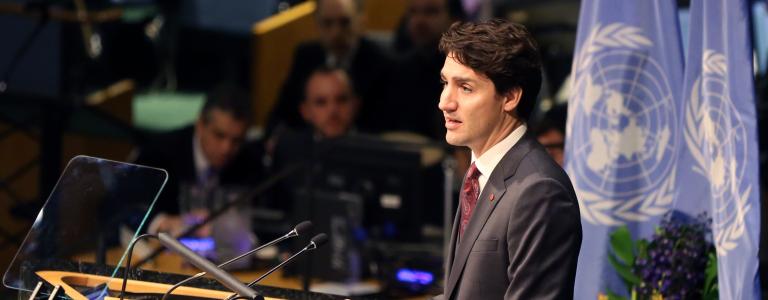How Canada Can Be a Global Leader on the Sustainable Development Goals
In an opinion piece originally published in The Hill Times, Julia Sánchez (CCIC) and Scott Vaughan argue that other countries are voluntarily reporting on progress on the Sustainable Development Goals, while Canada has no clear plan.
All eyes were on the United Nations two weeks ago as Prime Minister Justin Trudeau made his inaugural speech to the General Assembly.
The speech was forward-looking, laying out a hopeful and ambitious case for building inclusive and diverse societies, and recognizing that Canadians are unavoidably affected by and linked to “what happens beyond our borders.”
The federal government now needs a framework and an action plan to implement its vision for Canada and the world.
Fortunately, a global framework such as this already exists: the Sustainable Development Goals.
Last week marked the first anniversary of when world leaders at the UN adopted Transforming our World: the 2030 Agenda for Sustainable Development, an agenda that lays out 17 Sustainable Development Goals (SDGs) for all countries—including Canada—to end global poverty and other pressing challenges.
Agenda 2030 represents a comprehensive and integrated approach to sustainable development. It looks to tackle many of the issues the prime minister identified in his speech: education and infrastructure, building a fair and inclusive economy, tackling inequality and climate change, and addressing the rights and needs of women and Canada’s Indigenous peoples, among others.
Many other countries have recognized that the SDGs represent a clear opportunity for generating greater coherence in government policy around issues of society, economy, and environment, and they are using the framework to shape their future policies. At the UN High-Level Political Forum on Sustainable Development last July, 22 countries voluntarily reported on progress towards implementing the SDGs.
Colombia has established a multistakeholder high-level commission to implement the 2030 Agenda, which reports to the president and works with civil society, the private sector, and local government on implementation.
China and Norway have assigned the 17 goals to specific departments and established a mechanism to coordinate efforts. In Switzerland, the cabinet has developed a multi-sector, multistakeholder, cross-ministerial strategy to implement the goals.
Germany has gone one step further, revising its National Sustainability Strategy to integrate all 17 SDGs, requiring all line ministries to align with and report against this overarching strategy to the German chancellery. Finland’s whole-of-society approach is similarly led by a National Commission on Sustainable Development housed in the prime minister’s office.
In Canada, however, we have yet to see high-level leadership on this issue. Though there have been welcome references to the SDGs in speeches by the prime minister and in documents for consultations on the Federal Sustainable Development Strategy and the International Assistance Review, there have yet to be clear, concrete, and bold steps to advance the SDGs within Canada.
The SDGs provide a compelling framework in which to shape Canada’s ambitious domestic and international agenda, including creating genuine partnerships with Indigenous communities, more actively engaging the provinces and municipalities, advancing social justice and gender equality, and ramping up low carbon pathways. So what can Canada do to improve its policy alignment in this area, and seize the opportunity to use the SDGs to advance its policy objectives on the domestic and global stage?
First, this fall Prime Minister Trudeau should establish an interministerial committee on the SDGs reporting directly to him. This can help better integrate the government’s social, economic, and environmental policies into a coherent approach to sustainable development both at home and abroad. The outcome of the International Assistance Review and the new sustainable development strategy, to be released in October, can be starting points for discussions, moving well beyond just issues of aid and environment to an approach that is fully inclusive of society and economy.
Second, Canada should establish a multistakeholder national roundtable or commission to engage Canadians around solutions to sustainable development and foster a whole-of-society approach to implementing the SDGs. This must actively engage with the three levels of government, Indigenous authorities, civil society, the private sector, and Canadians on implementing the SDGs both in Canada and overseas.
Third, Canada should volunteer to appear before the next meeting of the High-Level Political Forum in 2017 and present a voluntary national review that will indicate how it is implementing Agenda 2030.
Finally, to commemorate Canada’s 150th anniversary, the prime minister should announce an SDG action plan that matches the ambition of his vision and forges a new global path for Canada—one that is led by a whole-of-Canada approach to “transforming our world.”
The prime minister, including in his role as youth minister, has set a new course in building a more inclusive and sustainable Canada for current and future generations. Substantively embracing and implementing the SDGs will be a significant and lasting contribution to Canada’s own sustainable development, as well as helping to build a better world.
This article was originally posted on The Hill Times website on October 5, 2016, and is reprinted here with permission.
You might also be interested in
Toward a Coherent, Transformative Approach to Financing Sustainable Development, Climate, and Nature
Four key proposals for the Fourth Financing for Development Conference (FfD4) to create an integrated, equitable approach to financing climate, nature, and development goals.
Green Public Procurement in India
This report analyzes the status of green public procurement (GPP) in India and suggests key strategies for advancing sustainable procurement practices.
Budgeting for Net Zero
This study estimates the cost gap for battery energy storage systems (BESSs), offshore wind, solar photovoltaic (PV), electric vehicles (EVs), and green hydrogen (GH2) to inform government support.
Plastics Treaty Must Remain Ambitious — We Can’t Give Up Now
The last round of the plastics treaty negotiations in Busan, South Korea, did not result in a deal, but the momentum is palpable. We must seize this opportunity and keep working toward an ambitious treaty that addresses the entire plastics life cycle.
